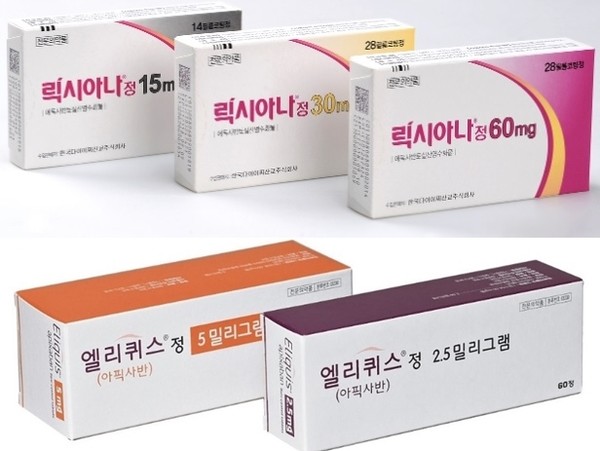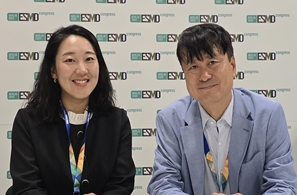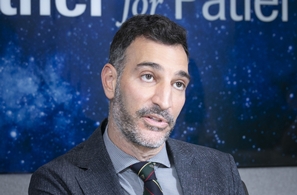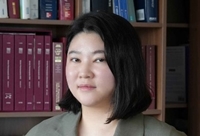- Series of drug patent expiries change ₩250B DOAC mkt
- by Moon, sung-ho | translator Kang, Shin-Kook | May 21, 2024 05:55am
This is due to the series of patent expiries of original drugs that had recorded high sales, mainly in the cardiology departments of university hospitals and clinic-level medical centers.

According to industry sources on the 18th, generic versions of original DOACs from major global pharmaceutical companies have recently been launched or announced one after another upon the originals’ patent expiry.
DOACs that are currently prescribed in internal medicine hospitals and clinics and form the major market in Korea are Bayer’s Xarelto (rivaroxaban), Boehringer Ingelheim’s Pradaxa (dabigatran), BMS’s Eliquis (apixaban), and Daiichi Sankyo’s Lixiana (edoxaban).
Among these, Xarelto’s decline in the prescription market has become more pronounced in recent years with its patent expiry in 2H 2022, and the bulk of domestic generics versions that followed.
According to the drug research institution UBIST, Xarelto’s prescriptions plummeted 37% from KRW 49.4 billion in 2022 to KRW 31 billion in 2023. The downward trend has continued in Q1 this year, recording sales of KRW 7.6 billion.
In addition, another blockbuster, BMS’s Eliquis, is also set to go off patent in 2H this year.
As a result, generic versions of this drug are also expected to flood the market once the patent expires in September, which is expected to affect prescriptions. For reference, Eliquis has continued to dominate the clinical scene, with prescriptions totaling KRW 77.3 billion last year. In Q1 this year, its sales amounted to KRW 19.3 billion, but the general prospect is that this sales flow will change after the launch of its generics.
In fact, major domestic companies are already preparing to launch generic versions of Eliquis. For example, Dongkook Pharmaceutical recently received approval from the Ministry of Food and Drug Safety for “Apigaban,” an apixaban generic.
These changes are expected to solidify the sole lead of Daiichi Sankyo's Lixiana, which has been strengthening its market dominance in the field.
Lixiana, which is marketed by Daewoong Pharmaceutical, has recently surpassed Eliquis in sales and solidified its dominance in the field.
Last year, Lixiana's sales in Korea reached KRW 105.3 billion, and in Q1 this year, the drug posted 27.7 billion won in sales, continuing on its upward trend.
"The sales of DOACs do not fluctuate much due to their need in clinical practice," said a professor of cardiology at A University Hospital, who requested anonymity. "But if generic versions are released, prescriptions will naturally be dispersed due to drug prices.”
He added, "Due to rising interest in its utility after its reimbursement approval following transcatheter aortic valve implantation (TAVI) procedure, and due to the need for its continued use, pharmaceutical companies will essentially seek to own one product. It will be interesting to see how the global pharmaceutical companies that own the original products respond."
The industry is watching BMS's moves following the patent expiration of Eliquis.
BMS has recently undergone a major restructuring at its headquarters level.
Last month, BMS reported Q1 earnings that beat expectations, with sales of multiple myeloma drugs ‘Revlimid’ and ‘Eliquis’ coming in higher than expected.
However, one-time costs related to recently closed M&A deals turned the quarter into a loss, and the company said it would focus its resources on R&D programs that will provide the biggest return on investment going forward.
In the process, the company announced that it would lay off 2,200 employees this year, discontinue some development programs, consolidate operations, and reduce management layers. In fact, after the BMS headquarters’ announcement, restructuring started in Japan and elsewhere.
This is why there is a lot of industry speculation on whether the announcement will affect its Korean subsidiary as well.
The series of generic Eliquis drugs that are set to be released upon the original drug’s expiry is also adding strength to the speculation. AstraZeneca also recently withdrew its diabetes drug Forxiga (dapagliflozin) from the Korean market after the launch of its generic versions, closed down the division, and offered voluntary retirement programs.
In other words, some worry that global pharmaceutical companies will again launch early retirement programs following the patent expiry of their original drug and the launch of generics.
However, BMS Korea denied any such plan.
BMS Korea said, "We have no plans set following Eliquis’s patent expiry. We are alternating activities in the domestic market with Pfizer. Our plans at the headquarters level were implemented to strengthen our portfolio through recent M&A and intensive investment in R&D, and are independent of the Korean situation. At this time, we do not have any plans related to Eliquis’s patent expiry."
-

- 0
댓글 운영방식은
댓글은 실명게재와 익명게재 방식이 있으며, 실명은 이름과 아이디가 노출됩니다. 익명은 필명으로 등록 가능하며, 대댓글은 익명으로 등록 가능합니다.
댓글 노출방식은
댓글 명예자문위원(팜-코니언-필기모양 아이콘)으로 위촉된 데일리팜 회원의 댓글은 ‘게시판형 보기’와 ’펼쳐보기형’ 리스트에서 항상 최상단에 노출됩니다. 새로운 댓글을 올리는 일반회원은 ‘게시판형’과 ‘펼쳐보기형’ 모두 팜코니언 회원이 쓴 댓글의 하단에 실시간 노출됩니다.
댓글의 삭제 기준은
다음의 경우 사전 통보없이 삭제하고 아이디 이용정지 또는 영구 가입제한이 될 수도 있습니다.
-
저작권·인격권 등 타인의 권리를 침해하는 경우
상용 프로그램의 등록과 게재, 배포를 안내하는 게시물
타인 또는 제3자의 저작권 및 기타 권리를 침해한 내용을 담은 게시물
-
근거 없는 비방·명예를 훼손하는 게시물
특정 이용자 및 개인에 대한 인신 공격적인 내용의 글 및 직접적인 욕설이 사용된 경우
특정 지역 및 종교간의 감정대립을 조장하는 내용
사실 확인이 안된 소문을 유포 시키는 경우
욕설과 비어, 속어를 담은 내용
정당법 및 공직선거법, 관계 법령에 저촉되는 경우(선관위 요청 시 즉시 삭제)
특정 지역이나 단체를 비하하는 경우
특정인의 명예를 훼손하여 해당인이 삭제를 요청하는 경우
특정인의 개인정보(주민등록번호, 전화, 상세주소 등)를 무단으로 게시하는 경우
타인의 ID 혹은 닉네임을 도용하는 경우
-
게시판 특성상 제한되는 내용
서비스 주제와 맞지 않는 내용의 글을 게재한 경우
동일 내용의 연속 게재 및 여러 기사에 중복 게재한 경우
부분적으로 변경하여 반복 게재하는 경우도 포함
제목과 관련 없는 내용의 게시물, 제목과 본문이 무관한 경우
돈벌기 및 직·간접 상업적 목적의 내용이 포함된 게시물
게시물 읽기 유도 등을 위해 내용과 무관한 제목을 사용한 경우
-
수사기관 등의 공식적인 요청이 있는 경우
-
기타사항
각 서비스의 필요성에 따라 미리 공지한 경우
기타 법률에 저촉되는 정보 게재를 목적으로 할 경우
기타 원만한 운영을 위해 운영자가 필요하다고 판단되는 내용
-
사실 관계 확인 후 삭제
저작권자로부터 허락받지 않은 내용을 무단 게재, 복제, 배포하는 경우
타인의 초상권을 침해하거나 개인정보를 유출하는 경우
당사에 제공한 이용자의 정보가 허위인 경우 (타인의 ID, 비밀번호 도용 등)
※이상의 내용중 일부 사항에 적용될 경우 이용약관 및 관련 법률에 의해 제재를 받으실 수도 있으며, 민·형사상 처벌을 받을 수도 있습니다.
※위에 명시되지 않은 내용이더라도 불법적인 내용으로 판단되거나 데일리팜 서비스에 바람직하지 않다고 판단되는 경우는 선 조치 이후 본 관리 기준을 수정 공시하겠습니다.
※기타 문의 사항은 데일리팜 운영자에게 연락주십시오. 메일 주소는 dailypharm@dailypharm.com입니다.









